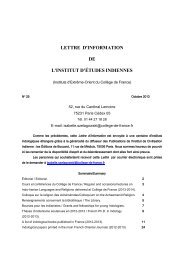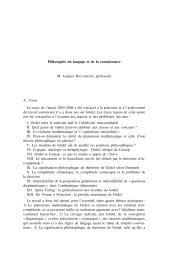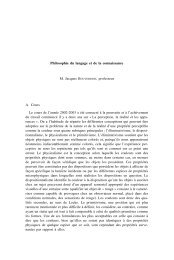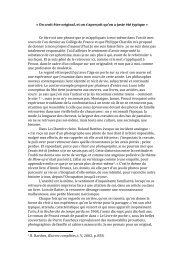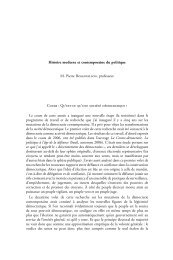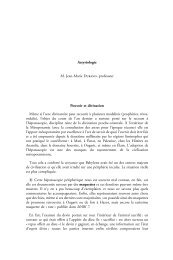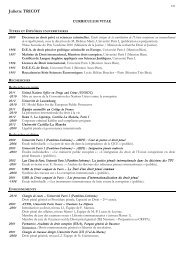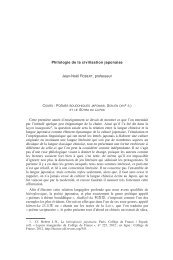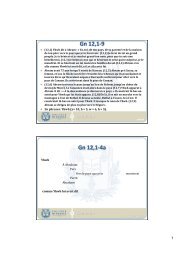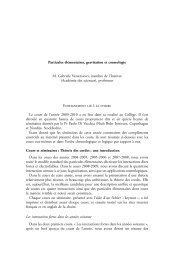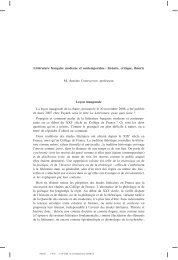- Page 1 and 2:
ANNUAIRE DU COLLÈGE DE FRANCE 2007
- Page 3 and 4:
LE COLLÈGE DE FRANCE QUELQUES DONN
- Page 5 and 6:
possèdent désormais, sur la place
- Page 7 and 8:
latine en Philologie latine, avec p
- Page 9 and 10:
Enfin a été créée, en 1984, une
- Page 11 and 12:
l’Orient musulman pour Albert Gab
- Page 13 and 14:
Dans le même ordre d’études, d
- Page 15 and 16:
Jean-Baptiste Delambre (1807-1822)
- Page 17 and 18:
pathologique a eu pour titulaire Lo
- Page 19 and 20:
linguistique de l’Europe pendant
- Page 21 and 22:
TABLEAU DES CHAIRES DEPUIS 1800 Cha
- Page 23 and 24:
1821 Droit de la nature et des gens
- Page 25 and 26:
1840 Économie politique Économie
- Page 27 and 28:
Éloquence latine Éloquence latine
- Page 29 and 30:
1869 Poésie latine Poésie latine
- Page 31 and 32:
1880 Économie politique Économie
- Page 33 and 34:
1899 Histoire de la philosophie mod
- Page 35 and 36:
1911 Langues et littératures hébr
- Page 37 and 38:
Création Épidémiologie Hyacinthe
- Page 39 and 40:
1937 Langue et littérature frança
- Page 41 and 42:
Civilisation américaine Histoire d
- Page 43 and 44:
Chimie organique Chimie organique d
- Page 45 and 46:
1970 Civilisations de l’Extrême-
- Page 47 and 48:
Langues et littératures de l’Ind
- Page 49 and 50:
1991 Philosophie de la connaissance
- Page 51 and 52:
Fondements et principes de la Biolo
- Page 53 and 54:
Chaire européenne Sandro Stringari
- Page 55 and 56:
IV. LE RÔLE PROPRE ET L’ORGANISA
- Page 57 and 58:
C’est pourquoi, aux leçons propr
- Page 59 and 60:
Fondation Paul Dellheim Par décret
- Page 61 and 62:
1913. Arnaud Denjoy. 1914. Édouard
- Page 63 and 64:
1952. Paul Rivet. 1953. Alfred Mét
- Page 65 and 66:
Pierre Mahé, M. André Langaney, M
- Page 67 and 68:
CHRONIQUE DE L’ANNÉE ACADÉMIQUE
- Page 69 and 70:
NÉCROLOGIE François MOREL (1923-2
- Page 71:
NÉCROLOGIE 73 Il se décrivait com
- Page 75 and 76:
Caractérisation spectrale des vari
- Page 77 and 78:
ANALYSE ET GÉOMÉTRIE 79 On utilis
- Page 79 and 80:
ANALYSE ET GÉOMÉTRIE 81 Alors l
- Page 81 and 82:
ANALYSE ET GÉOMÉTRIE 83 forme (4.
- Page 83:
ANALYSE ET GÉOMÉTRIE 85 Conféren
- Page 86 and 87:
88 JEAN-CHRISTOPHE YOCCOZ avons dé
- Page 88 and 89:
90 JEAN-CHRISTOPHE YOCCOZ Théorèm
- Page 90 and 91:
92 JEAN-CHRISTOPHE YOCCOZ Théorèm
- Page 93 and 94:
Équations aux dérivées partielle
- Page 95 and 96:
ÉQUATIONS AUX DÉRIVÉES PARTIELLE
- Page 97 and 98:
ÉQUATIONS AUX DÉRIVÉES PARTIELLE
- Page 99 and 100:
ÉQUATIONS AUX DÉRIVÉES PARTIELLE
- Page 101 and 102:
ÉQUATIONS AUX DÉRIVÉES PARTIELLE
- Page 103 and 104:
Théorie des nombres M. Don Zagier,
- Page 105 and 106:
THÉORIE DES NOMBRES 107 géométri
- Page 107 and 108:
THÉORIE DES NOMBRES 109 résultats
- Page 109 and 110:
THÉORIE DES NOMBRES 111 fonction d
- Page 111 and 112:
THÉORIE DES NOMBRES 113 Paderborn,
- Page 113 and 114:
Le cours de l’année 2007-2008 Ph
- Page 115 and 116:
PHYSIQUE QUANTIQUE 117 par absorpti
- Page 117 and 118:
PHYSIQUE QUANTIQUE 119 photon (impu
- Page 119 and 120:
Autres conférences et séminaires
- Page 121 and 122:
PHYSIQUE QUANTIQUE 123 « puces »
- Page 123:
PHYSIQUE QUANTIQUE 125 que la prés
- Page 126 and 127:
128 MICHEL DEVORET représenter de
- Page 128 and 129:
130 MICHEL DEVORET La sixième leç
- Page 130 and 131:
132 MICHEL DEVORET 4. Publications
- Page 133 and 134:
1. Enseignement au Collège Particu
- Page 135 and 136:
PARTICULES ÉLÉMENTAIRES, GRAVITAT
- Page 137 and 138:
3.2. Gravitation PARTICULES ÉLÉME
- Page 139:
PARTICULES ÉLÉMENTAIRES, GRAVITAT
- Page 142 and 143:
144 XAVIER LE PICHON L’originalit
- Page 144 and 145:
146 XAVIER LE PICHON Publications d
- Page 147 and 148:
Évolution du climat et de l’océ
- Page 149 and 150:
ÉVOLUTION DU CLIMAT ET DE L’OCÉ
- Page 151 and 152:
ÉVOLUTION DU CLIMAT ET DE L’OCÉ
- Page 153 and 154:
ÉVOLUTION DU CLIMAT ET DE L’OCÉ
- Page 155 and 156:
ÉVOLUTION DU CLIMAT ET DE L’OCÉ
- Page 157 and 158:
ÉVOLUTION DU CLIMAT ET DE L’OCÉ
- Page 159:
ÉVOLUTION DU CLIMAT ET DE L’OCÉ
- Page 162 and 163:
164 ANTOINE LABEYRIE Prévu initial
- Page 164 and 165:
166 ANTOINE LABEYRIE et raisonnable
- Page 167 and 168:
Chimie des interactions moléculair
- Page 169 and 170:
) Polyéthers macrocycliques CHIMIE
- Page 171 and 172:
20% + N N Br O O O O O + + O O O O
- Page 173 and 174:
H 2N R 1 = H N Me O N N R 1 OMe H N
- Page 175 and 176:
CHIMIE DES INTERACTIONS MOLÉCULAIR
- Page 177 and 178:
CHIMIE DES INTERACTIONS MOLÉCULAIR
- Page 179 and 180:
CHIMIE DES INTERACTIONS MOLÉCULAIR
- Page 181 and 182:
CHIMIE DES INTERACTIONS MOLÉCULAIR
- Page 183 and 184:
Professeur Jean-Marie Lehn 47 conf
- Page 185 and 186:
Chimie de la matière condensée M.
- Page 187 and 188:
CHIMIE DE LA MATIÈRE CONDENSÉE 18
- Page 189 and 190:
CHIMIE DE LA MATIÈRE CONDENSÉE 19
- Page 191 and 192:
Encapsulation cellulaire en milieu
- Page 193 and 194:
Enseignement Génétique humaine M.
- Page 195 and 196:
GÉNÉTIQUE HUMAINE 197 du gène qu
- Page 197 and 198:
GÉNÉTIQUE HUMAINE 199 cours, le p
- Page 199 and 200:
GÉNÉTIQUE HUMAINE 201 avec son pr
- Page 201 and 202:
GÉNÉTIQUE HUMAINE 203 avec A. Beg
- Page 203 and 204:
GÉNÉTIQUE HUMAINE 205 La stratég
- Page 205 and 206:
GÉNÉTIQUE HUMAINE 207 Quatrièmem
- Page 207 and 208:
GÉNÉTIQUE HUMAINE 209 effectué e
- Page 209 and 210:
GÉNÉTIQUE HUMAINE 211 préparatio
- Page 211 and 212:
GÉNÉTIQUE HUMAINE 213 par des fil
- Page 213 and 214:
GÉNÉTIQUE HUMAINE 215 Laugel V.,
- Page 215 and 216:
Génétique et physiologie cellulai
- Page 217 and 218:
GÉNÉTIQUE ET PHYSIOLOGIE CELLULAI
- Page 219 and 220:
GÉNÉTIQUE ET PHYSIOLOGIE CELLULAI
- Page 221 and 222:
GÉNÉTIQUE ET PHYSIOLOGIE CELLULAI
- Page 223 and 224:
GÉNÉTIQUE ET PHYSIOLOGIE CELLULAI
- Page 225 and 226:
GÉNÉTIQUE ET PHYSIOLOGIE CELLULAI
- Page 227 and 228:
GÉNÉTIQUE ET PHYSIOLOGIE CELLULAI
- Page 229 and 230:
GÉNÉTIQUE ET PHYSIOLOGIE CELLULAI
- Page 231 and 232:
GÉNÉTIQUE ET PHYSIOLOGIE CELLULAI
- Page 233 and 234:
GÉNÉTIQUE ET PHYSIOLOGIE CELLULAI
- Page 235 and 236:
GÉNÉTIQUE ET PHYSIOLOGIE CELLULAI
- Page 237 and 238:
GÉNÉTIQUE ET PHYSIOLOGIE CELLULAI
- Page 239 and 240:
GÉNÉTIQUE ET PHYSIOLOGIE CELLULAI
- Page 241:
GÉNÉTIQUE ET PHYSIOLOGIE CELLULAI
- Page 244 and 245:
246 SPYROS ARTAVANIS-TSAKONAS signi
- Page 246 and 247:
248 SPYROS ARTAVANIS-TSAKONAS molé
- Page 248 and 249:
250 SPYROS ARTAVANIS-TSAKONAS L’i
- Page 250 and 251:
252 SPYROS ARTAVANIS-TSAKONAS Publi
- Page 252 and 253:
254 ALAIN PROCHIANTZ morphogènes d
- Page 254 and 255:
256 ALAIN PROCHIANTZ d’entrer tro
- Page 256 and 257:
258 ALAIN PROCHIANTZ 24. Goldberg,
- Page 258 and 259:
260 ALAIN PROCHIANTZ Séminaire Le
- Page 260 and 261:
262 ALAIN PROCHIANTZ d’ATP. Cet A
- Page 262 and 263:
264 ALAIN PROCHIANTZ actuellement e
- Page 265 and 266:
I. Enseignement Immunologie molécu
- Page 267 and 268:
IMMUNOLOGIE MOLÉCULAIRE 269 mammif
- Page 269 and 270:
IMMUNOLOGIE MOLÉCULAIRE 271 • Pe
- Page 271 and 272:
IMMUNOLOGIE MOLÉCULAIRE 273 1 er t
- Page 273 and 274:
IMMUNOLOGIE MOLÉCULAIRE 275 • Le
- Page 275 and 276:
Enseignement Psychologie cognitive
- Page 277 and 278:
PSYCHOLOGIE COGNITIVE EXPÉRIMENTAL
- Page 279 and 280:
PSYCHOLOGIE COGNITIVE EXPÉRIMENTAL
- Page 281 and 282:
PSYCHOLOGIE COGNITIVE EXPÉRIMENTAL
- Page 283 and 284:
PSYCHOLOGIE COGNITIVE EXPÉRIMENTAL
- Page 285 and 286:
PSYCHOLOGIE COGNITIVE EXPÉRIMENTAL
- Page 287 and 288:
PSYCHOLOGIE COGNITIVE EXPÉRIMENTAL
- Page 289 and 290:
PSYCHOLOGIE COGNITIVE EXPÉRIMENTAL
- Page 291 and 292:
PSYCHOLOGIE COGNITIVE EXPÉRIMENTAL
- Page 293 and 294:
PSYCHOLOGIE COGNITIVE EXPÉRIMENTAL
- Page 295 and 296:
PSYCHOLOGIE COGNITIVE EXPÉRIMENTAL
- Page 297 and 298:
Articles originaux PSYCHOLOGIE COGN
- Page 299:
PSYCHOLOGIE COGNITIVE EXPÉRIMENTAL
- Page 302 and 303:
304 ALAIN BERTHOZ Une première cat
- Page 304 and 305:
306 ALAIN BERTHOZ La pluralité int
- Page 306 and 307:
308 ALAIN BERTHOZ notamment les tec
- Page 308 and 309:
310 ALAIN BERTHOZ 2.2. Analyse quan
- Page 310 and 311:
312 ALAIN BERTHOZ se réactivant re
- Page 312 and 313:
314 ALAIN BERTHOZ 4.2. Modèles com
- Page 314 and 315:
316 ALAIN BERTHOZ dans la littérat
- Page 316 and 317:
318 ALAIN BERTHOZ reproduire, par r
- Page 318 and 319:
320 ALAIN BERTHOZ route (ou perspec
- Page 320 and 321:
322 ALAIN BERTHOZ menée : elle a p
- Page 322 and 323:
324 ALAIN BERTHOZ 2008 — Bullot,
- Page 324 and 325:
326 ALAIN BERTHOZ 2008 — Berthoz,
- Page 327 and 328:
Médecine expérimentale M. Pierre
- Page 329 and 330:
MÉDECINE EXPÉRIMENTALE 331 induit
- Page 331 and 332:
MÉDECINE EXPÉRIMENTALE 333 gauche
- Page 333 and 334:
MÉDECINE EXPÉRIMENTALE 335 de l
- Page 335 and 336:
MÉDECINE EXPÉRIMENTALE 337 aux va
- Page 337 and 338:
MÉDECINE EXPÉRIMENTALE 339 les ce
- Page 339 and 340:
MÉDECINE EXPÉRIMENTALE 341 une ac
- Page 341 and 342:
MÉDECINE EXPÉRIMENTALE 343 — Un
- Page 343 and 344:
MÉDECINE EXPÉRIMENTALE 345 Sihn G
- Page 345:
MÉDECINE EXPÉRIMENTALE 347 Freita
- Page 348 and 349:
350 ARMAND DE RICQLÈS Le cours pro
- Page 350 and 351:
352 ARMAND DE RICQLÈS hyperdactyli
- Page 352 and 353:
354 ARMAND DE RICQLÈS plésiosaure
- Page 354 and 355:
356 ARMAND DE RICQLÈS nageurs d’
- Page 356 and 357:
358 ARMAND DE RICQLÈS Un premier a
- Page 358 and 359:
360 ARMAND DE RICQLÈS La relation
- Page 360 and 361:
362 ARMAND DE RICQLÈS Jeudi 22 mai
- Page 362 and 363:
364 ARMAND DE RICQLÈS Anick Aboura
- Page 364 and 365:
366 ARMAND DE RICQLÈS Bourdon E.,
- Page 366 and 367:
368 ARMAND DE RICQLÈS Montes L., C
- Page 368 and 369:
370 ARMAND DE RICQLÈS Autres produ
- Page 370 and 371:
372 ARMAND DE RICQLÈS — Pascal P
- Page 373 and 374:
Paléontologie humaine M. Michel Br
- Page 375 and 376:
PALÉONTOLOGIE HUMAINE 377 vers l
- Page 377 and 378:
PALÉONTOLOGIE HUMAINE 379 Tous ces
- Page 379 and 380:
PALÉONTOLOGIE HUMAINE 381 véritab
- Page 381 and 382:
PALÉONTOLOGIE HUMAINE 383 de datat
- Page 383 and 384:
PALÉONTOLOGIE HUMAINE 385 28 mai :
- Page 385 and 386:
PALÉONTOLOGIE HUMAINE 387 Enseigne
- Page 387 and 388:
PALÉONTOLOGIE HUMAINE 389 Congrès
- Page 389:
PALÉONTOLOGIE HUMAINE 391 Geraads
- Page 393 and 394:
A. Cours Philosophie du langage et
- Page 395 and 396:
PHILOSOPHIE DU LANGAGE ET DE LA CON
- Page 397 and 398:
PHILOSOPHIE DU LANGAGE ET DE LA CON
- Page 399 and 400:
PHILOSOPHIE DU LANGAGE ET DE LA CON
- Page 401 and 402:
PHILOSOPHIE DU LANGAGE ET DE LA CON
- Page 403 and 404:
PHILOSOPHIE DU LANGAGE ET DE LA CON
- Page 405 and 406:
Philosophie des sciences biologique
- Page 407 and 408:
PHILOSOPHIE DES SCIENCES BIOLOGIQUE
- Page 409 and 410:
PHILOSOPHIE DES SCIENCES BIOLOGIQUE
- Page 411 and 412:
PHILOSOPHIE DES SCIENCES BIOLOGIQUE
- Page 413 and 414:
PHILOSOPHIE DES SCIENCES BIOLOGIQUE
- Page 415 and 416:
PHILOSOPHIE DES SCIENCES BIOLOGIQUE
- Page 417 and 418:
PHILOSOPHIE DES SCIENCES BIOLOGIQUE
- Page 419 and 420:
PHILOSOPHIE DES SCIENCES BIOLOGIQUE
- Page 421 and 422:
PHILOSOPHIE DES SCIENCES BIOLOGIQUE
- Page 423 and 424:
PHILOSOPHIE DES SCIENCES BIOLOGIQUE
- Page 425 and 426:
PHILOSOPHIE DES SCIENCES BIOLOGIQUE
- Page 427 and 428:
PHILOSOPHIE DES SCIENCES BIOLOGIQUE
- Page 429 and 430:
PHILOSOPHIE DES SCIENCES BIOLOGIQUE
- Page 431:
PHILOSOPHIE DES SCIENCES BIOLOGIQUE
- Page 434 and 435:
436 MICHEL TARDIEU à celui d’Hel
- Page 436 and 437:
438 MICHEL TARDIEU pays de la soif
- Page 438 and 439:
440 MICHEL TARDIEU syriaque (guéri
- Page 440 and 441:
442 MICHEL TARDIEU Publications —
- Page 442 and 443:
444 MICHEL TARDIEU Publications —
- Page 445 and 446:
Le cours n’a pas eu lieu. Anthrop
- Page 447 and 448:
Chaire théorie économique et orga
- Page 449 and 450:
THÉORIE ÉCONOMIQUE ET ORGANISATIO
- Page 451 and 452:
THÉORIE ÉCONOMIQUE ET ORGANISATIO
- Page 453 and 454:
THÉORIE ÉCONOMIQUE ET ORGANISATIO
- Page 455:
Ouvrages (direction) THÉORIE ÉCON
- Page 458 and 459:
460 PIERRE ROSANVALLON Elle acquier
- Page 460 and 461:
462 PIERRE ROSANVALLON « librement
- Page 462 and 463:
464 PIERRE ROSANVALLON telle entrep
- Page 464 and 465:
466 PIERRE ROSANVALLON Pour ressais
- Page 466 and 467:
468 PIERRE ROSANVALLON Vulgarisatio
- Page 468 and 469:
470 ROGER CHARTIER Parmi les vingt
- Page 470 and 471:
472 ROGER CHARTIER L’une ou l’a
- Page 472 and 473:
474 ROGER CHARTIER n’y trouve la
- Page 474 and 475:
476 ROGER CHARTIER de la Mancha le
- Page 476 and 477:
478 ROGER CHARTIER a suscité. Les
- Page 478 and 479:
480 ROGER CHARTIER ces occasions /
- Page 480 and 481:
482 ROGER CHARTIER échangés », e
- Page 482 and 483:
484 ROGER CHARTIER la même gravure
- Page 484 and 485:
486 ROGER CHARTIER selon le stéré
- Page 486 and 487:
488 ROGER CHARTIER Les trois œuvre
- Page 488 and 489:
490 ROGER CHARTIER imprimant les «
- Page 490 and 491:
492 ROGER CHARTIER Davenant, cinq d
- Page 492 and 493:
494 ROGER CHARTIER — « La univer
- Page 495 and 496:
Histoire contemporaine du monde ara
- Page 497 and 498:
HISTOIRE CONTEMPORAINE DU MONDE ARA
- Page 499 and 500:
HISTOIRE CONTEMPORAINE DU MONDE ARA
- Page 501:
HISTOIRE CONTEMPORAINE DU MONDE ARA
- Page 504 and 505:
506 JON ELSTER rationnel il est san
- Page 506 and 507:
508 JON ELSTER « chaude ». Or nou
- Page 508 and 509:
510 JON ELSTER Dans un environnemen
- Page 510 and 511:
512 JON ELSTER suppression d’une
- Page 512 and 513:
514 JON ELSTER certains cas, l’ac
- Page 514 and 515:
516 JON ELSTER Les croyances sont o
- Page 516 and 517:
518 JON ELSTER L’acquisition d’
- Page 518 and 519:
520 JON ELSTER Le cours couvre éga
- Page 520 and 521:
522 MIREILLE DELMAS-MARTY Conventio
- Page 522 and 523:
524 MIREILLE DELMAS-MARTY C’est a
- Page 524 and 525:
526 MIREILLE DELMAS-MARTY à la vie
- Page 526 and 527:
528 MIREILLE DELMAS-MARTY Notre ana
- Page 528 and 529:
530 MIREILLE DELMAS-MARTY l’homme
- Page 530 and 531:
532 MIREILLE DELMAS-MARTY ressource
- Page 532 and 533:
534 MIREILLE DELMAS-MARTY En ce qui
- Page 534 and 535:
536 MIREILLE DELMAS-MARTY Le rôle
- Page 536 and 537:
538 MIREILLE DELMAS-MARTY Mais comm
- Page 538 and 539:
540 MIREILLE DELMAS-MARTY juridicti
- Page 540 and 541:
542 MIREILLE DELMAS-MARTY d’ident
- Page 542 and 543:
544 MIREILLE DELMAS-MARTY Recherche
- Page 544 and 545:
546 MIREILLE DELMAS-MARTY internati
- Page 547 and 548:
Cours et séminaire Civilisation ph
- Page 549 and 550:
CIVILISATION PHARAONIQUE : ARCHÉOL
- Page 551 and 552:
CIVILISATION PHARAONIQUE : ARCHÉOL
- Page 553 and 554:
CIVILISATION PHARAONIQUE : ARCHÉOL
- Page 555 and 556:
CIVILISATION PHARAONIQUE : ARCHÉOL
- Page 557 and 558:
Annales I, 56-84 CIVILISATION PHARA
- Page 559 and 560:
CIVILISATION PHARAONIQUE : ARCHÉOL
- Page 561 and 562:
CIVILISATION PHARAONIQUE : ARCHÉOL
- Page 563 and 564:
Assyriologie M. Jean-Marie Durand,
- Page 565 and 566:
ASSYRIOLOGIE 567 recourait à l’a
- Page 567 and 568:
ASSYRIOLOGIE 569 On connaît l’im
- Page 569 and 570:
4. L’interrogation ominale ASSYRI
- Page 571 and 572:
ASSYRIOLOGIE 573 Chaque interrogati
- Page 573 and 574:
ASSYRIOLOGIE 575 L’observation de
- Page 575 and 576:
ASSYRIOLOGIE 577 d’un signe omine
- Page 577:
ASSYRIOLOGIE 579 — « “Un habit
- Page 580 and 581:
582 PIERRE BRIANT vues sur le conqu
- Page 582 and 583:
584 PIERRE BRIANT 18 février 1768)
- Page 584 and 585:
586 PIERRE BRIANT grandes découver
- Page 586 and 587:
588 PIERRE BRIANT qu’Alexandre b
- Page 588 and 589:
590 PIERRE BRIANT « Histoire du Si
- Page 591 and 592:
Épigraphie et histoire des cités
- Page 593 and 594:
ÉPIGRAPHIE ET HISTOIRE DES CITÉS
- Page 595 and 596:
ÉPIGRAPHIE ET HISTOIRE DES CITÉS
- Page 597 and 598:
ÉPIGRAPHIE ET HISTOIRE DES CITÉS
- Page 599 and 600:
ÉPIGRAPHIE ET HISTOIRE DES CITÉS
- Page 601 and 602:
ÉPIGRAPHIE ET HISTOIRE DES CITÉS
- Page 603 and 604:
ÉPIGRAPHIE ET HISTOIRE DES CITÉS
- Page 605 and 606:
ÉPIGRAPHIE ET HISTOIRE DES CITÉS
- Page 607 and 608:
ÉPIGRAPHIE ET HISTOIRE DES CITÉS
- Page 609 and 610:
ÉPIGRAPHIE ET HISTOIRE DES CITÉS
- Page 611 and 612:
ÉPIGRAPHIE ET HISTOIRE DES CITÉS
- Page 613 and 614:
ÉPIGRAPHIE ET HISTOIRE DES CITÉS
- Page 615 and 616:
ÉPIGRAPHIE ET HISTOIRE DES CITÉS
- Page 617:
ÉPIGRAPHIE ET HISTOIRE DES CITÉS
- Page 620 and 621:
622 JOHN SCHEID celui qui parlait l
- Page 622 and 623:
624 JOHN SCHEID communis opinio de
- Page 624 and 625:
626 JOHN SCHEID reconnaissaient que
- Page 626 and 627:
628 JOHN SCHEID Sacrés en tant que
- Page 628 and 629:
630 JOHN SCHEID c’est-à-dire pou
- Page 630 and 631:
632 JOHN SCHEID est merveilleux par
- Page 632 and 633:
634 JOHN SCHEID les Sondergötter d
- Page 634 and 635:
636 JOHN SCHEID — Séminaires à
- Page 637 and 638:
Langues et religions indo-iranienne
- Page 639 and 640:
LANGUES ET RELIGIONS INDO-IRANIENNE
- Page 641 and 642:
Histoire du monde indien M. Gérard
- Page 643 and 644:
HISTOIRE DU MONDE INDIEN 645 Deyadh
- Page 645 and 646:
HISTOIRE DU MONDE INDIEN 647 recher
- Page 647 and 648:
HISTOIRE DU MONDE INDIEN 649 jour).
- Page 649 and 650:
Histoire de la Chine moderne M. Pie
- Page 651 and 652:
HISTOIRE DE LA CHINE MODERNE 653 si
- Page 653 and 654:
HISTOIRE DE LA CHINE MODERNE 655 to
- Page 655 and 656:
HISTOIRE DE LA CHINE MODERNE 657 ce
- Page 657 and 658:
HISTOIRE DE LA CHINE MODERNE 659 in
- Page 659 and 660:
HISTOIRE DE LA CHINE MODERNE 661 fo
- Page 661 and 662:
HISTOIRE DE LA CHINE MODERNE 663 t
- Page 663 and 664:
HISTOIRE DE LA CHINE MODERNE 665 Li
- Page 665 and 666:
HISTOIRE DE LA CHINE MODERNE 667 Da
- Page 667 and 668:
HISTOIRE DE LA CHINE MODERNE 669 yu
- Page 669 and 670:
HISTOIRE DE LA CHINE MODERNE 671 de
- Page 671 and 672:
I. COURS Antiquités nationales M.
- Page 673 and 674:
ANTIQUITÉS NATIONALES 675 L’impo
- Page 675 and 676:
ANTIQUITÉS NATIONALES 677 avec les
- Page 677 and 678:
Histoire turque et ottomane M. Gill
- Page 679 and 680:
HISTOIRE TURQUE ET OTTOMANE 681 cha
- Page 681 and 682:
HISTOIRE TURQUE ET OTTOMANE 683 abs
- Page 683 and 684:
HISTOIRE TURQUE ET OTTOMANE 685 Les
- Page 685 and 686:
HISTOIRE TURQUE ET OTTOMANE 687 une
- Page 687 and 688:
HISTOIRE TURQUE ET OTTOMANE 689 For
- Page 689 and 690:
HISTOIRE TURQUE ET OTTOMANE 691 D
- Page 691 and 692:
HISTOIRE TURQUE ET OTTOMANE 693 ‘
- Page 693 and 694:
HISTOIRE TURQUE ET OTTOMANE 695 obt
- Page 695 and 696:
HISTOIRE TURQUE ET OTTOMANE 697 ada
- Page 697 and 698:
HISTOIRE TURQUE ET OTTOMANE 699 en
- Page 699 and 700:
HISTOIRE TURQUE ET OTTOMANE 701 l
- Page 701 and 702:
HISTOIRE TURQUE ET OTTOMANE 703 Con
- Page 703 and 704:
Littératures de la France médiév
- Page 705 and 706:
LITTÉRATURES DE LA FRANCE MÉDIÉV
- Page 707 and 708:
LITTÉRATURES DE LA FRANCE MÉDIÉV
- Page 709 and 710:
LITTÉRATURES DE LA FRANCE MÉDIÉV
- Page 711 and 712:
LITTÉRATURES DE LA FRANCE MÉDIÉV
- Page 713 and 714:
LITTÉRATURES DE LA FRANCE MÉDIÉV
- Page 715 and 716:
LITTÉRATURES DE LA FRANCE MÉDIÉV
- Page 717 and 718:
Livre LITTÉRATURES DE LA FRANCE M
- Page 719:
Colloques : LITTÉRATURES DE LA FRA
- Page 722 and 723:
724 ANTOINE COMPAGNON d’un revire
- Page 724 and 725:
726 ANTOINE COMPAGNON donner des in
- Page 726 and 727:
728 ANTOINE COMPAGNON Les « milice
- Page 728 and 729:
730 ANTOINE COMPAGNON La « grande
- Page 730 and 731:
732 ANTOINE COMPAGNON obtiendront m
- Page 732 and 733:
734 ANTOINE COMPAGNON raisonné, ra
- Page 734 and 735:
736 ANTOINE COMPAGNON En voici un a
- Page 736 and 737:
738 ANTOINE COMPAGNON « Proust et
- Page 739 and 740:
1. « Orgiasme » Littératures mod
- Page 741 and 742:
LITTÉRATURES MODERNES DE L’EUROP
- Page 743 and 744:
LITTÉRATURES MODERNES DE L’EUROP
- Page 745 and 746:
2. « Repos » LITTÉRATURES MODERN
- Page 747 and 748:
LITTÉRATURES MODERNES DE L’EUROP
- Page 749 and 750:
LITTÉRATURES MODERNES DE L’EUROP
- Page 751 and 752:
LITTÉRATURES MODERNES DE L’EUROP
- Page 753 and 754:
Étude de la création littéraire
- Page 755 and 756:
ÉTUDE DE LA CRÉATION LITTÉRAIRE
- Page 757 and 758:
ÉTUDE DE LA CRÉATION LITTÉRAIRE
- Page 759 and 760:
ÉTUDE DE LA CRÉATION LITTÉRAIRE
- Page 761 and 762:
ÉTUDE DE LA CRÉATION LITTÉRAIRE
- Page 763 and 764:
ÉTUDE DE LA CRÉATION LITTÉRAIRE
- Page 765 and 766:
ÉTUDE DE LA CRÉATION LITTÉRAIRE
- Page 767 and 768:
ÉTUDE DE LA CRÉATION LITTÉRAIRE
- Page 769 and 770:
ÉTUDE DE LA CRÉATION LITTÉRAIRE
- Page 771 and 772:
ÉTUDE DE LA CRÉATION LITTÉRAIRE
- Page 773:
ÉTUDE DE LA CRÉATION LITTÉRAIRE
- Page 776 and 777:
778 ROLAND RECHT Ouvrages : — Le
- Page 779:
Le cours n’a pas eu lieu. Chaire
- Page 782 and 783:
784 MANFRED KROPP sujet singulier e
- Page 784 and 785:
786 MANFRED KROPP naturellement. Il
- Page 786 and 787:
788 MANFRED KROPP le sens de « dem
- Page 788 and 789:
790 MANFRED KROPP est que le verset
- Page 790 and 791:
792 MANFRED KROPP Le texte de la so
- Page 792 and 793:
794 MANFRED KROPP Après ce tour de
- Page 794 and 795:
796 MANFRED KROPP seul. C’est bie
- Page 796 and 797:
798 MANFRED KROPP fois, soit une ex
- Page 798 and 799:
800 MANFRED KROPP Participations au
- Page 801 and 802:
Chaire internationale M. Pierre Mag
- Page 803 and 804:
CHAIRE INTERNATIONALE 805 énergét
- Page 805 and 806:
CHAIRE INTERNATIONALE 807 Ainsi, su
- Page 807 and 808:
Les flux métaboliques astrocytaire
- Page 809 and 810:
CHAIRE INTERNATIONALE 811 effectue
- Page 811 and 812:
CHAIRE INTERNATIONALE 813 par réso
- Page 813 and 814:
CHAIRE INTERNATIONALE 815 amplifier
- Page 815 and 816:
CHAIRE INTERNATIONALE 817 Chiry O.,
- Page 817:
CHAIRE INTERNATIONALE 819 [17] Frad
- Page 820 and 821:
822 GÉRARD BERRY donc de commencer
- Page 822 and 823:
824 GÉRARD BERRY — des algorithm
- Page 824 and 825:
826 GÉRARD BERRY calcul de la rete
- Page 826 and 827:
828 GÉRARD BERRY 4. Cours circuits
- Page 828 and 829:
830 GÉRARD BERRY tester un à un t
- Page 830 and 831:
832 GÉRARD BERRY l’ensemble de s
- Page 832 and 833:
834 GÉRARD BERRY déterminisme. S
- Page 834 and 835:
836 GÉRARD BERRY 7.1. Qu’est-ce
- Page 836 and 837:
838 GÉRARD BERRY il est hautement
- Page 838 and 839:
840 GÉRARD BERRY transmettre sur u
- Page 840 and 841:
842 GÉRARD BERRY moteurs de recher
- Page 842 and 843:
844 GÉRARD BERRY photographie. L
- Page 844 and 845:
846 GÉRARD BERRY données et des i
- Page 846 and 847:
848 PROFESSEURS HONORAIRES — « L
- Page 848 and 849:
850 PROFESSEURS HONORAIRES normal t
- Page 850 and 851:
852 PROFESSEURS HONORAIRES — Depa
- Page 852 and 853:
854 PROFESSEURS HONORAIRES — Jack
- Page 854 and 855:
856 PROFESSEURS HONORAIRES — Conf
- Page 856 and 857:
858 PROFESSEURS HONORAIRES M. Fran
- Page 858 and 859:
860 PROFESSEURS HONORAIRES Yves Cop
- Page 860 and 861:
862 PROFESSEURS HONORAIRES aux él
- Page 862 and 863:
864 PROFESSEURS HONORAIRES Porto-Ve
- Page 864 and 865:
866 PROFESSEURS HONORAIRES Il a pub
- Page 866 and 867:
868 PROFESSEURS HONORAIRES « L’i
- Page 868 and 869:
870 PROFESSEURS HONORAIRES et S. Ph
- Page 870 and 871:
872 PROFESSEURS HONORAIRES — « F
- Page 872 and 873:
874 PROFESSEURS HONORAIRES — Allo
- Page 874 and 875:
876 PROFESSEURS HONORAIRES continue
- Page 876 and 877:
878 PROFESSEURS HONORAIRES avec l
- Page 878 and 879: 880 PROFESSEURS HONORAIRES Exposés
- Page 880 and 881: 882 PROFESSEURS HONORAIRES — Du 1
- Page 882 and 883: 884 ENSEIGNEMENT DES PROFESSEURS EN
- Page 884 and 885: 886 ENSEIGNEMENT DES PROFESSEURS EN
- Page 886 and 887: 888 ENSEIGNEMENT DES PROFESSEURS EN
- Page 888 and 889: 890 COURS ET CONFÉRENCES botanique
- Page 890 and 891: 892 COURS ET CONFÉRENCES M me Mari
- Page 892 and 893: 894 RÉSUMÉS DES COURS ET CONFÉRE
- Page 894 and 895: 896 RÉSUMÉS DES COURS ET CONFÉRE
- Page 896 and 897: 898 RÉSUMÉS DES COURS ET CONFÉRE
- Page 898 and 899: 900 RÉSUMÉS DES COURS ET CONFÉRE
- Page 900 and 901: 902 RÉSUMÉS DES COURS ET CONFÉRE
- Page 902 and 903: 904 RÉSUMÉS DES COURS ET CONFÉRE
- Page 904 and 905: 906 RÉSUMÉS DES COURS ET CONFÉRE
- Page 906 and 907: 908 RÉSUMÉS DES COURS ET CONFÉRE
- Page 908 and 909: 910 RÉSUMÉS DES COURS ET CONFÉRE
- Page 910 and 911: 912 RÉSUMÉS DES COURS ET CONFÉRE
- Page 912 and 913: 914 RÉSUMÉS DES COURS ET CONFÉRE
- Page 914 and 915: 916 RÉSUMÉS DES COURS ET CONFÉRE
- Page 916 and 917: 918 RÉSUMÉS DES COURS ET CONFÉRE
- Page 918 and 919: 920 RÉSUMÉS DES COURS ET CONFÉRE
- Page 920 and 921: 922 RÉSUMÉS DES COURS ET CONFÉRE
- Page 922 and 923: 924 RÉSUMÉS DES COURS ET CONFÉRE
- Page 924 and 925: 926 RÉSUMÉS DES COURS ET CONFÉRE
- Page 926 and 927: 928 RÉSUMÉS DES COURS ET CONFÉRE
- Page 931 and 932: LES ÉQUIPES ACCUEILLIES AU COLLÈG
- Page 933 and 934: LES ÉQUIPES ACCUEILLIES AU COLLÈG
- Page 935 and 936: 1. Organisation LES ÉQUIPES ACCUEI
- Page 937 and 938: LES ÉQUIPES ACCUEILLIES AU COLLÈG
- Page 939 and 940: LES ÉQUIPES ACCUEILLIES AU COLLÈG
- Page 941 and 942: LES ÉQUIPES ACCUEILLIES AU COLLÈG
- Page 943 and 944: LES ÉQUIPES ACCUEILLIES AU COLLÈG
- Page 945 and 946: LES ÉQUIPES ACCUEILLIES AU COLLÈG
- Page 947 and 948: LES ÉQUIPES ACCUEILLIES AU COLLÈG
- Page 949 and 950: LES ÉQUIPES ACCUEILLIES AU COLLÈG
- Page 951 and 952: LES ÉQUIPES ACCUEILLIES AU COLLÈG
- Page 953 and 954: LES ÉQUIPES ACCUEILLIES AU COLLÈG
- Page 955 and 956: LES ÉQUIPES ACCUEILLIES AU COLLÈG
- Page 957 and 958: LES ÉQUIPES ACCUEILLIES AU COLLÈG
- Page 959 and 960: LES ÉQUIPES ACCUEILLIES AU COLLÈG
- Page 961 and 962: LES ÉQUIPES ACCUEILLIES AU COLLÈG
- Page 963 and 964: LES ÉQUIPES ACCUEILLIES AU COLLÈG
- Page 965 and 966: LES ÉQUIPES ACCUEILLIES AU COLLÈG
- Page 967 and 968: LES ÉQUIPES ACCUEILLIES AU COLLÈG
- Page 969 and 970: LES ÉQUIPES ACCUEILLIES AU COLLÈG
- Page 971 and 972: LES ÉQUIPES ACCUEILLIES AU COLLÈG
- Page 973: Revues et Ouvrages LES ÉQUIPES ACC
- Page 976 and 977: 978 MAÎTRES DE CONFÉRENCES ET ATE
- Page 978 and 979:
980 PERSONNEL DU COLLÈGE DE FRANCE
- Page 980 and 981:
982 PERSONNEL DU COLLÈGE DE FRANCE
- Page 982 and 983:
984 PERSONNEL DU COLLÈGE DE FRANCE
- Page 984 and 985:
986 PERSONNEL DU COLLÈGE DE FRANCE
- Page 986 and 987:
988 INSTANCES STATUTAIRES ET ADMINI
- Page 988 and 989:
990 INSTANCES STATUTAIRES ET ADMINI
- Page 990 and 991:
992 INSTANCES STATUTAIRES ET ADMINI
- Page 992 and 993:
994 INSTANCES STATUTAIRES ET ADMINI
- Page 994 and 995:
996 INSTANCES STATUTAIRES ET ADMINI
- Page 997 and 998:
PROGRAMME DES COURS DE L’ANNÉE 2
- Page 999 and 1000:
PROGRAMME DES COURS DE L’ANNÉE 2
- Page 1001 and 1002:
PROGRAMME DES COURS DE L’ANNÉE 2
- Page 1003 and 1004:
PROGRAMME DES COURS DE L’ANNÉE 2
- Page 1005 and 1006:
PROGRAMME DES COURS DE L’ANNÉE 2
- Page 1007 and 1008:
PROGRAMME DES COURS DE L’ANNÉE 2
- Page 1009:
PROGRAMME DES COURS DE L’ANNÉE 2
- Page 1012 and 1013:
1014 PROGRAMME DES COURS DE L’ANN
- Page 1014 and 1015:
1016 PROGRAMME DES COURS DE L’ANN
- Page 1016 and 1017:
1018 PROGRAMME DES COURS DE L’ANN
- Page 1018 and 1019:
1020 TABLE DES MATIÈRES Astrophysi
- Page 1020:
1022 TABLE DES MATIÈRES Professeur



